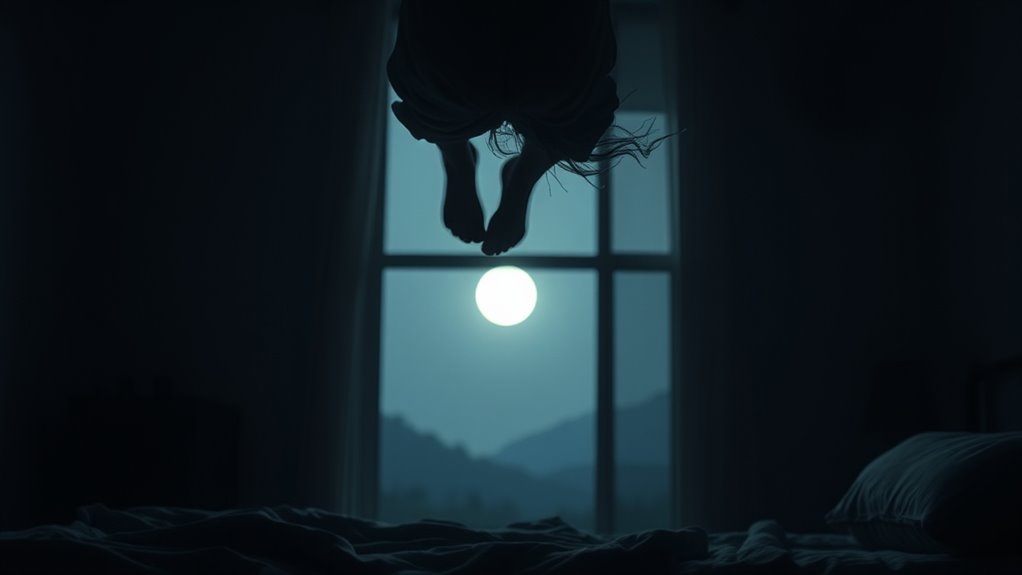Dreams of falling right before waking often happen because your brain struggles to smoothly shift between sleep stages. These sensations reflect feelings of vulnerability or losing control that linger during disrupted sleep cycles. They usually occur during moments of heightened arousal or stress, signaling subconscious fears. Understanding why your brain produces these vivid episodes can help you feel more in control of your sleep. If you’re curious about what causes these sensations, there’s more to discover just ahead.
Key Takeaways
- Falling dreams often occur during sleep transitions when the brain partially wakes, causing sensations of plummeting.
- These dreams reflect subconscious fears of losing control or failure, especially as sleep deepens or lightens.
- Disruptions in normal sleep stages, such as stress or irregular schedules, heighten the likelihood of falling sensations.
- The vividness of these dreams is linked to heightened brain arousal during sleep-wake boundary crossings.
- Recognizing these episodes as natural responses to sleep disruptions can reduce anxiety and help manage the sensations.

Many people experience the unsettling sensation of falling just before waking up, a common type of nightmare that can leave you feeling shaken. This vivid imagery isn’t just a random dream; it often ties into deeper sleep phenomena like night terrors and sleep paralysis. Understanding why you often dream of falling at this moment can help you make sense of these disturbing episodes and may even improve your sleep quality.
Night terrors are intense episodes of fear that occur during non-REM sleep, usually in children but sometimes in adults. During a night terror, you might sit up abruptly, scream, or thrash around, feeling overwhelmed by a sense of dread. Falling dreams can be part of this experience because your brain is in a heightened state of arousal, even as your body remains physically paralyzed. The sensation of falling can be a manifestation of your subconscious panic, amplified by the confusion between wakefulness and sleep. When you wake up from a night terror, you often remember the fear vividly, but the falling sensation might linger as a residual feeling of vulnerability. This connection to sleep cycle disruptions highlights how complex and interconnected these experiences are. Additionally, these disruptions can be triggered by factors such as stress or irregular sleep schedules, which further disturb the normal sleep process.
Night terrors cause intense fear and falling sensations due to heightened arousal and paralysis during sleep.
Sleep paralysis, on the other hand, involves a temporary inability to move or speak while falling asleep or waking up. During this state, you’re caught between sleep and wakefulness, often experiencing hallucinations or a feeling of weightlessness—or in this case, falling. The sensation is so intense that many interpret it as a supernatural or frightening event. Falling dreams during sleep paralysis aren’t accidental; they reflect the brain’s partial wakefulness, where the mind is alert but the body remains immobilized. The mismatch between mental alertness and physical paralysis creates a vivid, often terrifying experience of plummeting through the darkness, which explains why falling dreams frequently occur during episodes of sleep paralysis.
Both night terrors and sleep paralysis involve disruptions in the normal sleep cycle, especially during shifts between sleep stages. Falling dreams are common during these moments because the brain is attempting to process complex emotions or fears, often resulting in a sensation of falling. This sensation may also be linked to your subconscious fears of losing control or failing, which are projected during these vivid dreams. Additionally, understanding the neuroscientific basis of these phenomena can help demystify why the brain generates such intense sensations during disrupted sleep.
In essence, dreaming of falling just before waking up is your mind’s way of traversing the boundary between sleep and wakefulness. Whether triggered by night terrors or sleep paralysis, these dreams tap into primal fears and the brain’s natural responses to disrupted sleep. Recognizing their origins can reduce fear and help you approach these experiences with more understanding, making it easier to manage them over time. Being aware of your sleep environment and establishing calming bedtime routines can also help mitigate these unsettling sensations.
Frequently Asked Questions
Can Falling Dreams Predict Future Events?
Falling dreams often reflect your subconscious fears and can symbolize feelings of loss of control or insecurity. While some believe dream symbolism hints at future events, there’s no scientific proof that falling dreams predict the future. Instead, they reveal your emotional state and worries. Pay attention to these dreams as they can help you understand your inner fears, but don’t rely on them to forecast actual upcoming events.
Do Falling Dreams Mean I Have Anxiety?
Think of your mind as a ship steering through a stormy sea; falling dreams can signal hidden anxiety triggers. When you experience sleep disturbances, your subconscious might be alerting you to stress or worries. These dreams don’t necessarily mean you have anxiety, but they often reflect underlying tension. Recognizing these signals helps you address stress before it impacts your sleep, guiding you toward calmer waters and better rest.
Are Falling Dreams More Common in Certain Age Groups?
Falling dreams can happen across all age groups, but they’re often more common in certain stages of life. During childhood, nightmares involving falling are frequent as part of age-related sleep development. As you age, stress and anxiety can trigger these dreams more often. Sleep patterns change over time, making falling dreams a common experience at various ages, especially during periods of increased stress or disrupted sleep.
How Do I Stop Having Falling Dreams?
Your mind is like a boat on choppy waters, sometimes rocking with falling dreams. To stop them, try calming your sleep with consistent routines and reduce stress. Practice lucid dreaming techniques to gain control, and address sleep paralysis by improving sleep posture. Visualize a safe landing before bed, and avoid screens before sleep. These steps help anchor your dreams, so you wake up feeling more grounded and in control.
Do Falling Dreams Occur During Specific Sleep Stages?
You might notice falling dreams during REM sleep, when your brain is most active and vivid dreams occur. These dreams often happen in lighter sleep stages, like NREM stages 1 and 2, as your body shift into deeper sleep. Dream interpretation suggests that falling dreams could symbolize feelings of insecurity or loss of control. Understanding your sleep stages can help you better interpret these common experiences and manage their frequency.
Conclusion
So, next time you feel yourself plummeting in a dream, remember it’s like a gentle nudge from your subconscious, reminding you to slow down and find balance. Just like a leaf caught in a drifting stream, your mind is steering the currents of your thoughts and fears. Falling dreams aren’t about danger—they’re your mind’s way of whispering, “Hey, take a breath and trust the journey.” Embrace them as a natural part of your inner landscape.









